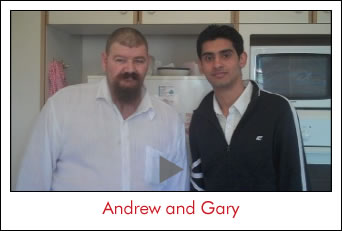- SELF STUDY MODULES
- 1. Intro to TBI
- 2. Communication
- 3. Skills for independence
- 4. Cognitive changes
- 5. Behaviour changes
- 6. Sexuality
- 7. Case management (BIR)
- 8. No longer available
- 9. Mobility & motor control
- 10. Mental health & TBI:
an introduction - 11. Mental health problems
and TBI: diagnosis
& management - 12. Working with Families
after Traumatic Injury:
An Introduction - 13. Goal setting
1.0 Define
- i) What is
ABI? TBI? - ii) Graphic:
What is TBI? - iii) What is TBI?
- iv) Video:
Gabby has a TBI Q -
v) Video:
Andrew has a TB I Q
i) What is ABI? TBI?
Traumatic brain injury (TBI)
Traumatic brain injury (TBI) is one form of acquired brain injury (ABI).
Acquired brain injury (ABI)
The Australian National Policy on Services for People with Acquired Brain Injury defines ABI as:
“ an injury to the brain which results in deterioration in cognitive, physical, emotional or independent functioning...these impairments to cognitive abilities or physical functioning may be either temporary or permanent and cause partial or total disability or psychosocial maladjustment.” (Department of Human Services and Health, 1994)
There are a number of common causes of ABI::
-
Traumatic brain injury - Traumatic brain injury occurs as the result of some external force being applied to the brain
-
Stroke - Stroke usually occurs as the result of a haemorrhage or blockage to the blood vessels that supply blood to the various regions of the brain
-
Hypoxia/anoxia - Hypoxia/anoxia refers to the reduced or complete stopping of the flow of oxygen to the brain leading to tissue damage, and can be caused by failed hangings, near drowning, or overdoses
-
Infection - Bacterial or viral infections can lead to an inflammation of the brain covering (meningitis) or the brain tissue itself (encephalitis)
-
Tumour - Tumours cause damage to the surrounding brain tissue and structures as they grow within the brain
-
Toxins - Alcohol acts as a toxin and the long term misuse of alcohol can cause damage to brain tissue.
-
Degenerative neurological diseases - Conditions including Huntingdon’s disease, Parkinson’s disease, and Alzheimer’s disease are caused by abnormal changes to brain cells in particular regions of the brain
People with TBI
Watching the videos throughout these modules is essential:
Watch the videos of Gabby and Andrew.
ii) Graphic: What is TBI?
(20 secs)
iii) What is TBI?
Traumatic brain injury occurs as the result of some external force being applied to the brain in an accident or trauma. As a result of this blow or rapid movement, the brain may be torn, stretched, penetrated, bruised or become swollen. Oxygen may not be able to get through to brain cells and there may be bleeding.
The common mechanisms of TBI include:
Acceleration/ Deceleration injuries: Refers to injuries in which the head is in motion and then abruptly comes to a halt. For example, if a car hits a tree, the car suddenly stops, and the driver's head hits the steering wheel. The brain within the skull still has forward momentum and can hit the inner surface of the skull (which has bony edges) with some force, causing bruising, lacerations and bleeding.
Diffuse axonal injury: The twisting motions or sudden changes in momentum that accompany some accidents may cause the bundles of nerve fibres to be stretched or shear. The term closed head injury is often used to describe this type of TBI, because the damage to the brain occurs as the result of these internal mechanisms, but usually with the skull remaining intact.
Penetrating injuries: This describes cases where some external object pierces the skull and comes in direct contact with the brain, thereby causing a TBI.
Other causes of brain trauma include falls, blows to the head, crushing injuries, electric shocks/ lightning strikes, and whiplash or violent shaking.
Traumatic brain injury is different from intellectual disability and psychiatric illness. Intellectual disabilities are congenital disabilities a person is born with, whereas TBI is acquired at a later stage of life, prior to which the brain functioned normally.
Psychiatric illness is due to a patient's brain malfunctioning, possibly due to chemical imbalances. It is not caused by traumatic head injury, and is not the result of physical damage to the brain.
iv) Gabby has an TBI (3.5 mins)
Click on the image to go to the video player.
Watch a short story of her on video.
Answer these questions
Are her impairments likely to be permanent or temporary
v) Andrew has an ABI (4 mins)
Click on the image to go to the video player. The video may take a few moments to load.
Watch Andrew's story on video.
Answer these questions
Are the impairments likely to be permanent or temporary?


